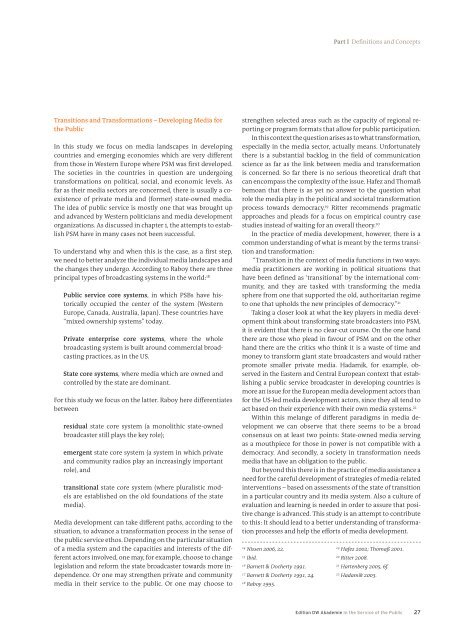edition-dw-akademie-in-the-service-of-the-public-functions-and-transformation-of-media-in-developing-countries-pdf
edition-dw-akademie-in-the-service-of-the-public-functions-and-transformation-of-media-in-developing-countries-pdf
edition-dw-akademie-in-the-service-of-the-public-functions-and-transformation-of-media-in-developing-countries-pdf
Create successful ePaper yourself
Turn your PDF publications into a flip-book with our unique Google optimized e-Paper software.
Part I Def<strong>in</strong>itions <strong>and</strong> ConceptsTransitions <strong>and</strong> Transformations – Develop<strong>in</strong>g Media for<strong>the</strong> PublicIn this study we focus on <strong>media</strong> l<strong>and</strong>scapes <strong>in</strong> develop<strong>in</strong>g<strong>countries</strong> <strong>and</strong> emerg<strong>in</strong>g economies which are very differentfrom those <strong>in</strong> Western Europe where PSM was first developed.The societies <strong>in</strong> <strong>the</strong> <strong>countries</strong> <strong>in</strong> question are undergo<strong>in</strong>g<strong>transformation</strong>s on political, social, <strong>and</strong> economic levels. Asfar as <strong>the</strong>ir <strong>media</strong> sectors are concerned, <strong>the</strong>re is usually a coexistence<strong>of</strong> private <strong>media</strong> <strong>and</strong> (former) state-owned <strong>media</strong>.The idea <strong>of</strong> <strong>public</strong> <strong>service</strong> is mostly one that was brought up<strong>and</strong> advanced by Western politicians <strong>and</strong> <strong>media</strong> developmentorganizations. As discussed <strong>in</strong> chapter 1, <strong>the</strong> attempts to establishPSM have <strong>in</strong> many cases not been successful.To underst<strong>and</strong> why <strong>and</strong> when this is <strong>the</strong> case, as a first step,we need to better analyze <strong>the</strong> <strong>in</strong>dividual <strong>media</strong> l<strong>and</strong>scapes <strong>and</strong><strong>the</strong> changes <strong>the</strong>y undergo. Accord<strong>in</strong>g to Raboy <strong>the</strong>re are threepr<strong>in</strong>cipal types <strong>of</strong> broadcast<strong>in</strong>g systems <strong>in</strong> <strong>the</strong> world: 18Public <strong>service</strong> core systems, <strong>in</strong> which PSBs have historicallyoccupied <strong>the</strong> center <strong>of</strong> <strong>the</strong> system (WesternEurope, Canada, Australia, Japan). These <strong>countries</strong> have“mixed ownership systems” today.Private enterprise core systems, where <strong>the</strong> wholebroadcast<strong>in</strong>g system is built around commercial broadcast<strong>in</strong>gpractices, as <strong>in</strong> <strong>the</strong> US.State core systems, where <strong>media</strong> which are owned <strong>and</strong>controlled by <strong>the</strong> state are dom<strong>in</strong>ant.For this study we focus on <strong>the</strong> latter. Raboy here differentiatesbetweenresidual state core system (a monolithic state-ownedbroadcaster still plays <strong>the</strong> key role);emergent state core system (a system <strong>in</strong> which private<strong>and</strong> community radios play an <strong>in</strong>creas<strong>in</strong>gly importantrole), <strong>and</strong>transitional state core system (where pluralistic modelsare established on <strong>the</strong> old foundations <strong>of</strong> <strong>the</strong> state<strong>media</strong>).Media development can take different paths, accord<strong>in</strong>g to <strong>the</strong>situation, to advance a <strong>transformation</strong> process <strong>in</strong> <strong>the</strong> sense <strong>of</strong><strong>the</strong> <strong>public</strong> <strong>service</strong> ethos. Depend<strong>in</strong>g on <strong>the</strong> particular situation<strong>of</strong> a <strong>media</strong> system <strong>and</strong> <strong>the</strong> capacities <strong>and</strong> <strong>in</strong>terests <strong>of</strong> <strong>the</strong> differentactors <strong>in</strong>volved, one may, for example, choose to changelegislation <strong>and</strong> reform <strong>the</strong> state broadcaster towards more <strong>in</strong>dependence.Or one may streng<strong>the</strong>n private <strong>and</strong> community<strong>media</strong> <strong>in</strong> <strong>the</strong>ir <strong>service</strong> to <strong>the</strong> <strong>public</strong>. Or one may choose tostreng<strong>the</strong>n selected areas such as <strong>the</strong> capacity <strong>of</strong> regional report<strong>in</strong>gor program formats that allow for <strong>public</strong> participation.In this context <strong>the</strong> question arises as to what <strong>transformation</strong>,especially <strong>in</strong> <strong>the</strong> <strong>media</strong> sector, actually means. Unfortunately<strong>the</strong>re is a substantial backlog <strong>in</strong> <strong>the</strong> field <strong>of</strong> communicationscience as far as <strong>the</strong> l<strong>in</strong>k between <strong>media</strong> <strong>and</strong> <strong>transformation</strong>is concerned. So far <strong>the</strong>re is no serious <strong>the</strong>oretical draft thatcan encompass <strong>the</strong> complexity <strong>of</strong> <strong>the</strong> issue. Hafez <strong>and</strong> Thomaßbemoan that <strong>the</strong>re is as yet no answer to <strong>the</strong> question whatrole <strong>the</strong> <strong>media</strong> play <strong>in</strong> <strong>the</strong> political <strong>and</strong> societal <strong>transformation</strong>process towards democracy. 19 Ritter recommends pragmaticapproaches <strong>and</strong> pleads for a focus on empirical country casestudies <strong>in</strong>stead <strong>of</strong> wait<strong>in</strong>g for an overall <strong>the</strong>ory. 20In <strong>the</strong> practice <strong>of</strong> <strong>media</strong> development, however, <strong>the</strong>re is acommon underst<strong>and</strong><strong>in</strong>g <strong>of</strong> what is meant by <strong>the</strong> terms transition<strong>and</strong> <strong>transformation</strong>:“Transition <strong>in</strong> <strong>the</strong> context <strong>of</strong> <strong>media</strong> <strong>functions</strong> <strong>in</strong> two ways:<strong>media</strong> practitioners are work<strong>in</strong>g <strong>in</strong> political situations thathave been def<strong>in</strong>ed as ‘transitional’ by <strong>the</strong> <strong>in</strong>ternational community,<strong>and</strong> <strong>the</strong>y are tasked with transform<strong>in</strong>g <strong>the</strong> <strong>media</strong>sphere from one that supported <strong>the</strong> old, authoritarian regimeto one that upholds <strong>the</strong> new pr<strong>in</strong>ciples <strong>of</strong> democracy.” 21Tak<strong>in</strong>g a closer look at what <strong>the</strong> key players <strong>in</strong> <strong>media</strong> developmentth<strong>in</strong>k about transform<strong>in</strong>g state broadcasters <strong>in</strong>to PSM,it is evident that <strong>the</strong>re is no clear-cut course. On <strong>the</strong> one h<strong>and</strong><strong>the</strong>re are those who plead <strong>in</strong> favour <strong>of</strong> PSM <strong>and</strong> on <strong>the</strong> o<strong>the</strong>rh<strong>and</strong> <strong>the</strong>re are <strong>the</strong> critics who th<strong>in</strong>k it is a waste <strong>of</strong> time <strong>and</strong>money to transform giant state broadcasters <strong>and</strong> would ra<strong>the</strong>rpromote smaller private <strong>media</strong>. Hadamik, for example, observed<strong>in</strong> <strong>the</strong> Eastern <strong>and</strong> Central European context that establish<strong>in</strong>ga <strong>public</strong> <strong>service</strong> broadcaster <strong>in</strong> develop<strong>in</strong>g <strong>countries</strong> ismore an issue for <strong>the</strong> European <strong>media</strong> development actors thanfor <strong>the</strong> US-led <strong>media</strong> development actors, s<strong>in</strong>ce <strong>the</strong>y all tend toact based on <strong>the</strong>ir experience with <strong>the</strong>ir own <strong>media</strong> systems. 22With<strong>in</strong> this melange <strong>of</strong> different paradigms <strong>in</strong> <strong>media</strong> developmentwe can observe that <strong>the</strong>re seems to be a broadconsensus on at least two po<strong>in</strong>ts: State-owned <strong>media</strong> serv<strong>in</strong>gas a mouthpiece for those <strong>in</strong> power is not compatible with ademocracy. And secondly, a society <strong>in</strong> <strong>transformation</strong> needs<strong>media</strong> that have an obligation to <strong>the</strong> <strong>public</strong>.But beyond this <strong>the</strong>re is <strong>in</strong> <strong>the</strong> practice <strong>of</strong> <strong>media</strong> assistance aneed for <strong>the</strong> careful development <strong>of</strong> strategies <strong>of</strong> <strong>media</strong>-related<strong>in</strong>terventions – based on assessments <strong>of</strong> <strong>the</strong> state <strong>of</strong> transition<strong>in</strong> a particular country <strong>and</strong> its <strong>media</strong> system. Also a culture <strong>of</strong>evaluation <strong>and</strong> learn<strong>in</strong>g is needed <strong>in</strong> order to assure that positivechange is advanced. This study is an attempt to contributeto this: It should lead to a better underst<strong>and</strong><strong>in</strong>g <strong>of</strong> <strong>transformation</strong>processes <strong>and</strong> help <strong>the</strong> efforts <strong>of</strong> <strong>media</strong> development.14Nissen 2006, 22.15Ibid.16Barnett & Docherty 1991.17Barnett & Docherty 1991, 24.18Raboy 1995.19Hafez 2002; Thomaß 2001.20Ritter 2008.21Hartenberg 2005, 6f.22Hadamik 2003.Edition DW Akademie In <strong>the</strong> Service <strong>of</strong> <strong>the</strong> Public 27


